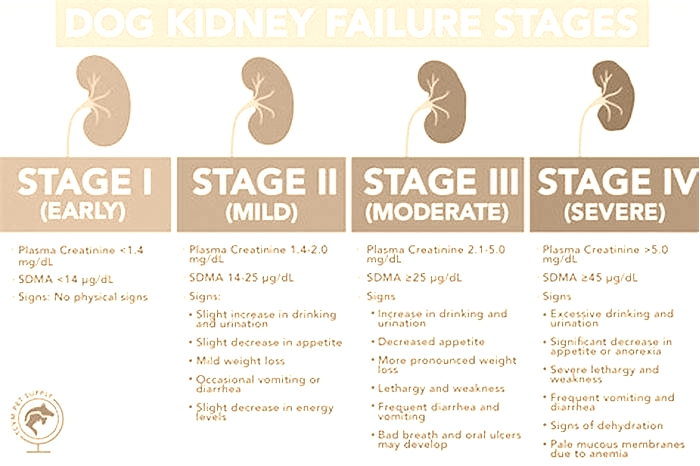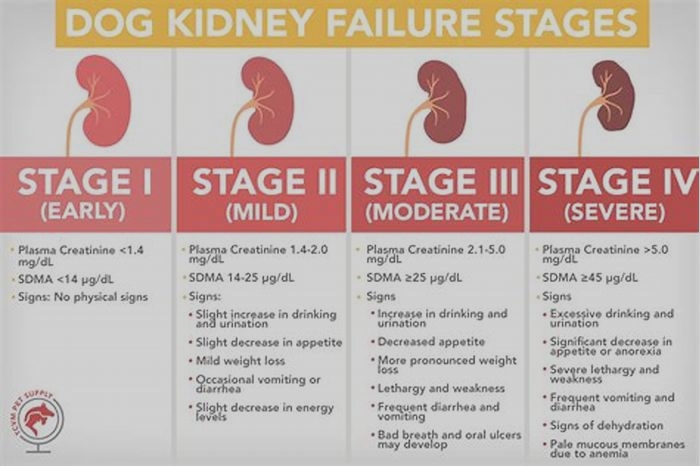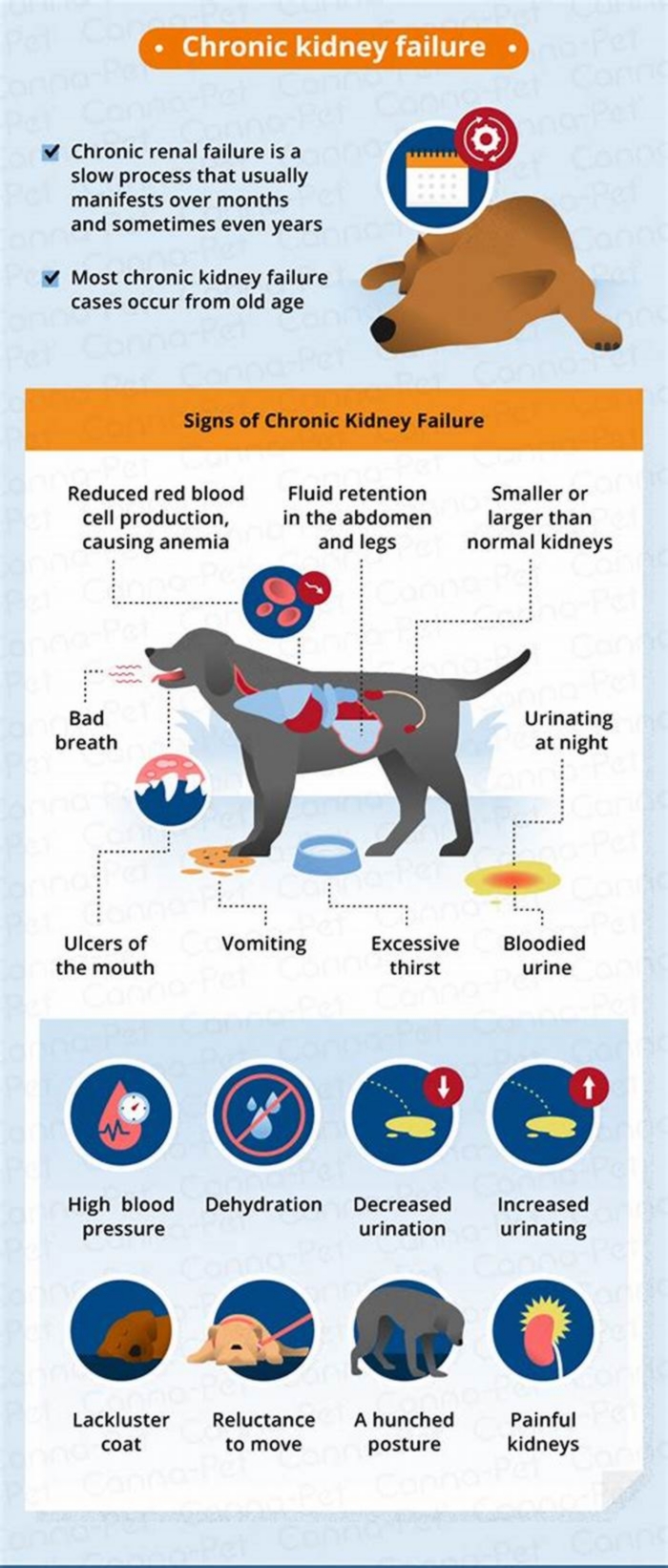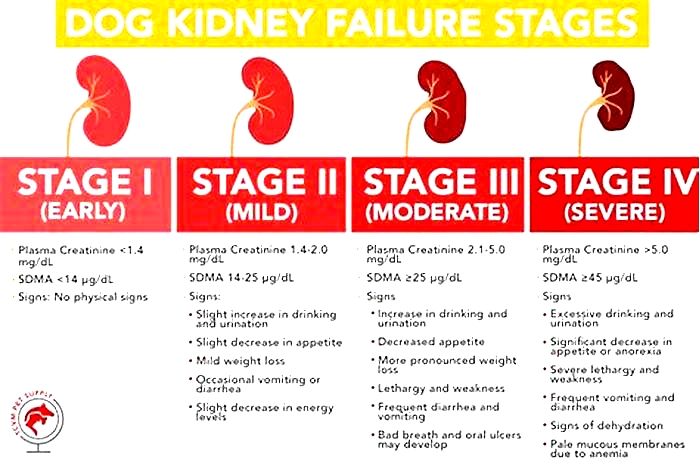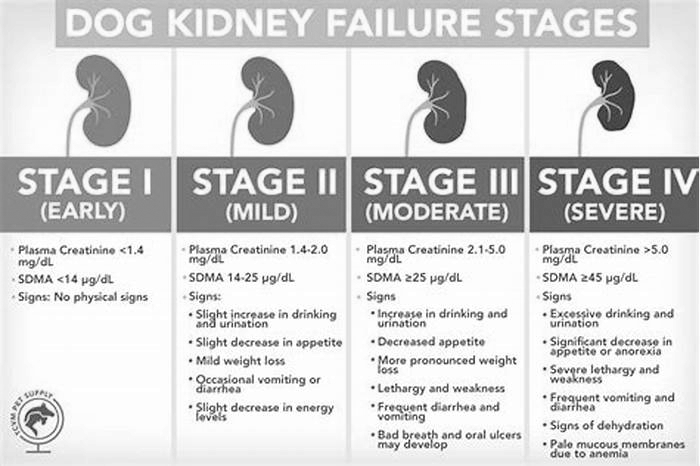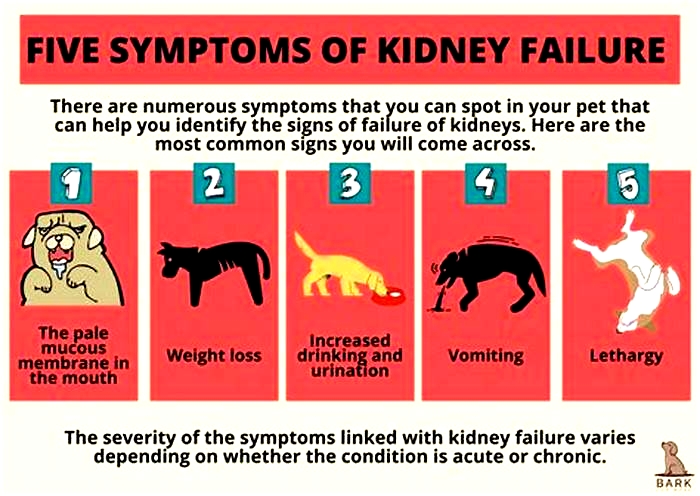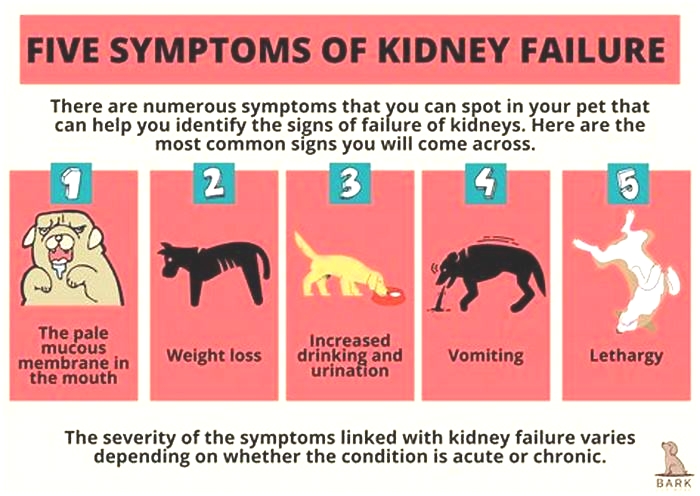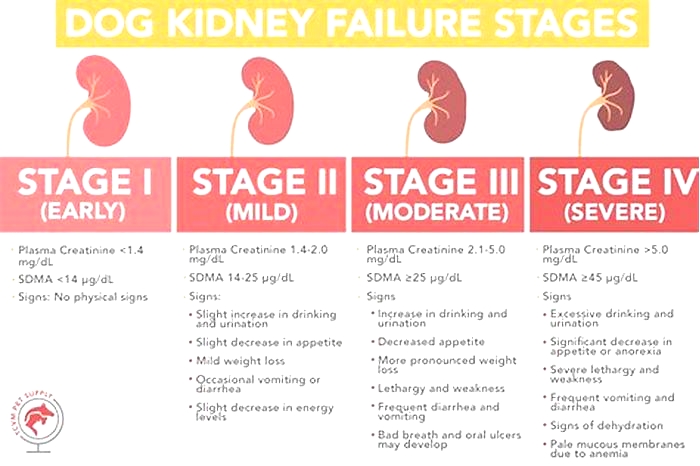kidney failure in my dog
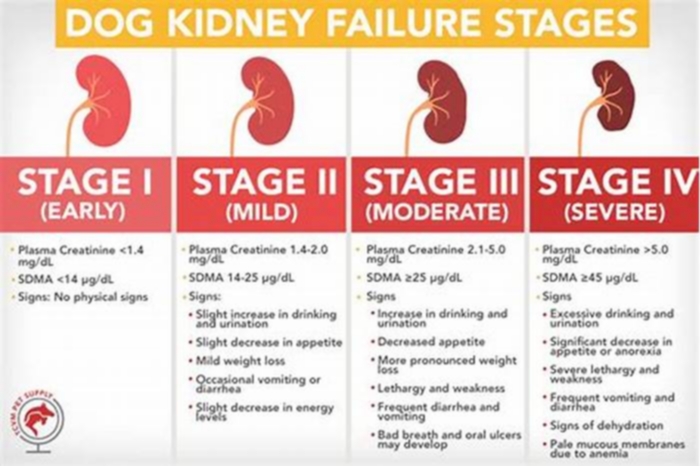
Kidney Failure in Dogs: Causes, Symptoms & Treatment
In this post, well dive into the causes of kidney failure in dogs, common symptoms you should look out for, available treatment options, and more.
Table of Contents
Pro Tip: Not all pet insurance will cover your vet bills if your dog develops a long-term illness. Thats why its very important to have the right pet insurance plan in place.
Types of kidney failure in dogs
Just like in humans, healthy kidneys in dogs control blood pressure, regulate hydration, remove toxins, release hormones needed to produce red blood cells, and maintain a normal electrolyte balance. If the kidney function is impaired, kidney failure occurs. When the kidneys dont work properly, a number of other organs can be affected, including the brain and heart.
Kidney failure (also called renal failure) in dogs can be chronic or acute:
Chronic kidney failure
This occurs when the kidneys lose function gradually and is typically caused by degeneration related to old age. Chronic kidney failure is the most common type of kidney disease in dogs, occurring in 0.5% to 1% of dogs.
Acute kidney failure
This occurs when a canine's kidney function suddenly decreases, usually within hours or a few days. Its typically caused by a severe kidney infection or the consumption of toxins.
The main difference between these two types of kidney failure is that acute kidney failure can be reversed with timely and aggressive treatment. Chronic kidney failure, on the other hand, cant be reversed or cured and it can only be managed. In most cases, the damage to the kidneys has been happening for more than three months and the kidneys will continue to worsen.
What causes kidney failure in dogs?
Chronic kidney failure in dogs
The exact cause of chronic kidney failure is often difficult to pinpoint because of its slow onset. Early symptoms are usually mild and can be easily overlooked or dismissed.
Dental disease is a leading cause of chronic renal failure in senior dogs. Bacteria build up in the animals teeth and enter the digestive system through eating and drinking, affecting the kidneys ability to filter waste over time.
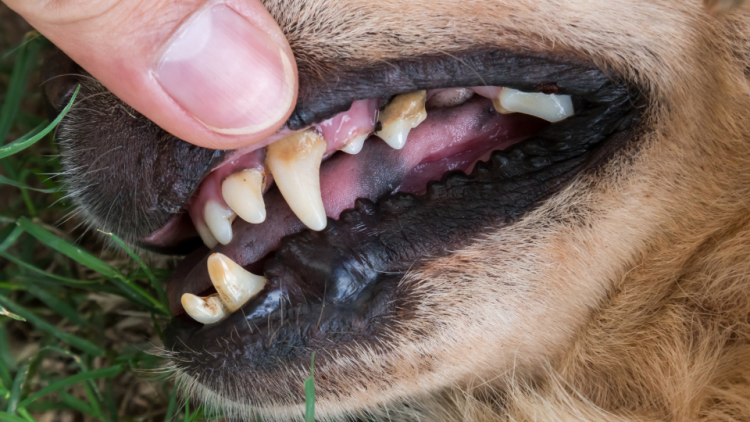
Chronic kidney failure can also be caused by:
- Congenital diseases or birth defects (such as agenesis, when the dog is born missing one or both kidneys)
- Kidney cancer (renal neoplasia)
- Polycystic kidney disease
- Kidney infections
- Fanconi syndrome
- Elevated calcium (hypercalcemia)
- Kidney stones
- Renal dysplasia
- Immune system dysfunction
- Poor blood flow to the kidneys
- Blocked urine movement or flow
- Certain medications (such as NSAIDs and some antibiotics)
Acute renal failure can also lead to chronic renal failure.
Acute kidney failure in dogs
Acute renal failure is most often a result of a dog ingesting poison. It might be antifreeze, household cleaners, or certain drugs. Some human foods like grapes and raisins have also been known to cause kidney failure if eaten frequently and in larger quantities.
Severe bacterial infections can also cause acute kidney failure. Even though kidney infections can occur spontaneously, theres usually a reason why the dog has trouble fighting off the infection, such as urine blockage or kidney stones.
Leptospirosis is one example of a bacterial infection that can cause sudden renal failure in pups. Our canine companions can get leptospirosis by coming into contact with infected urine, water, soil, water, food or bedding, or through a bite from an infected animal. Be sure to talk to your vet about vaccinating against this disease.
Kidney issues can also result from decreased blood flow through the kidneys. This can be caused by severe dehydration (usually from severe diarrhea or vomiting), heatstroke, or snake bites, and bee stings.
Signs of kidney failure in dogs
The most common symptoms in dogs with kidney failure include:
- Excessive thirst and urination
- Lethargy
- Decreased appetite
- Weight loss
- Bad breath
- Pale gums
- Vomiting
- Blood in urine
- Ulcers in the mouth
- Uncoordinated movement such as stumbling
- Intestinal seizures
Dogs with chronic renal failure might not show any clinical signs at first, or the signs might be very subtle.
In severe renal failure, the amount of urine might actually decrease, or the dog might stop making urine altogether. As the condition worsens, other symptoms may include blood in the stool, black or tarry stool, or vomiting blood.
Diagnosing kidney failure in dogs
Blood and urine tests are commonly performed to diagnose kidney failure. Other tests, such as ultrasound, X-rays, and special blood tests might be needed in order to assess the severity of the disease and determine the cause for the failure. In some cases, a biopsy of the kidney might be recommended.
How to treat kidney failure in dogs
Treatment for kidney failure in dogs will depend on the severity of the condition and the underlying reason that caused their kidney to fail.
Dogs with acute renal failure can get very ill and might need to be hospitalized. Milder cases can be treated with antibiotics and fluids on an outpatient basis.
In some cases, dialysis might be necessary. Signs that indicate dialysis should be considered include very high potassium levels, lack of improvement in lab results while the pet receives intravenous fluids, and fluid in the lungs. Both hemodialysis and peritoneal dialysis can be effective but are generally quite expensive.
While damage from acute renal failure is more easily treated, chronic renal failure will cause irreversible damage to your dogs kidneys unless caught early. For that reason, veterinarians generally focus on slowing down the progression of the disease and finding ways to improve the dogs quality of life, usually with medication and diet changes.
Your pups treatment plan might also include:
- Electrolytes to balance out blood levels
- Medications that encourage the production of urine
- Medications to ease gastrointestinal problems
- Medications to reduce vomiting
- Medications for anemia
- Blood pressure management
If kidney disease is left untreated, end-stage renal failure might occur, leading to death. If you suspect your pet has kidney failure, contact your veterinarian or take your dog to an emergency clinic for a diagnosis and treatment.
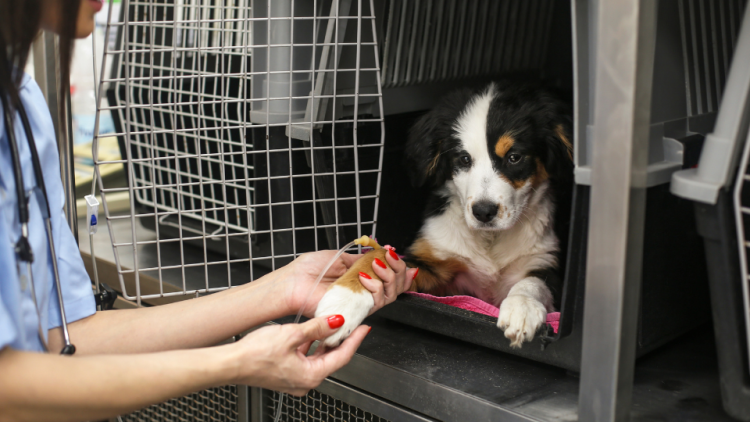
Cost to treat dogs kidney failure
The cost of diagnosis and treatment will also depend on the cause, as well as on how the dog responds. Initial diagnostic tests usually range between $200 and $750, whereas long-term management of chronic kidney failure can cost between $100 and $500 per month, depending on the prescribed medications and how often IV fluid therapy is required.
Pro Tip: Every dog owner should consider pet insurance. Even if you believe you have enough money to cover veterinary costs, pet insurance could still save you thousands of dollars if your dog gets sick or injured.
Whats the prognosis?
Kidney failure is a very serious disease and about 60% of pets suffering from it will either die or be euthanized because of it. In cases when medical treatment has failed, the chance of survival without dialysis is extremely low. About half of the patients that receive dialysis will recover, depending on what caused the failure. Many of them will recover only partially and end up with permanent kidney damage.
However, some pups manage to recover completely and have a good quality of life for years after being diagnosed with the disease.
Talk to your vet about what you should expect after your dog has been diagnosed and treated for kidney failure. The vet might recommend nutritional supplements and/or a therapeutic diet to manage your pups condition.
Preventing kidney failure in dogs
Considering the fact that acute renal failure is usually caused by ingesting toxins or foods like raisins, preventing it is fairly easy. Make sure to get any poisons, medications, and dog-unsafe foods out of your pups reach. You can also get your dog vaccinated for Leptospirosis.
Chronic renal failure is usually age-related and genetically predetermined, so theres not much you can do to prevent it. However, taking your pet for annual wellness checkups and physical exams can increase the chances of catching the disease early and start treatment before it progresses and becomes more serious.
Kidney Failure In Dogs: Causes, Symptoms & Treatment Options
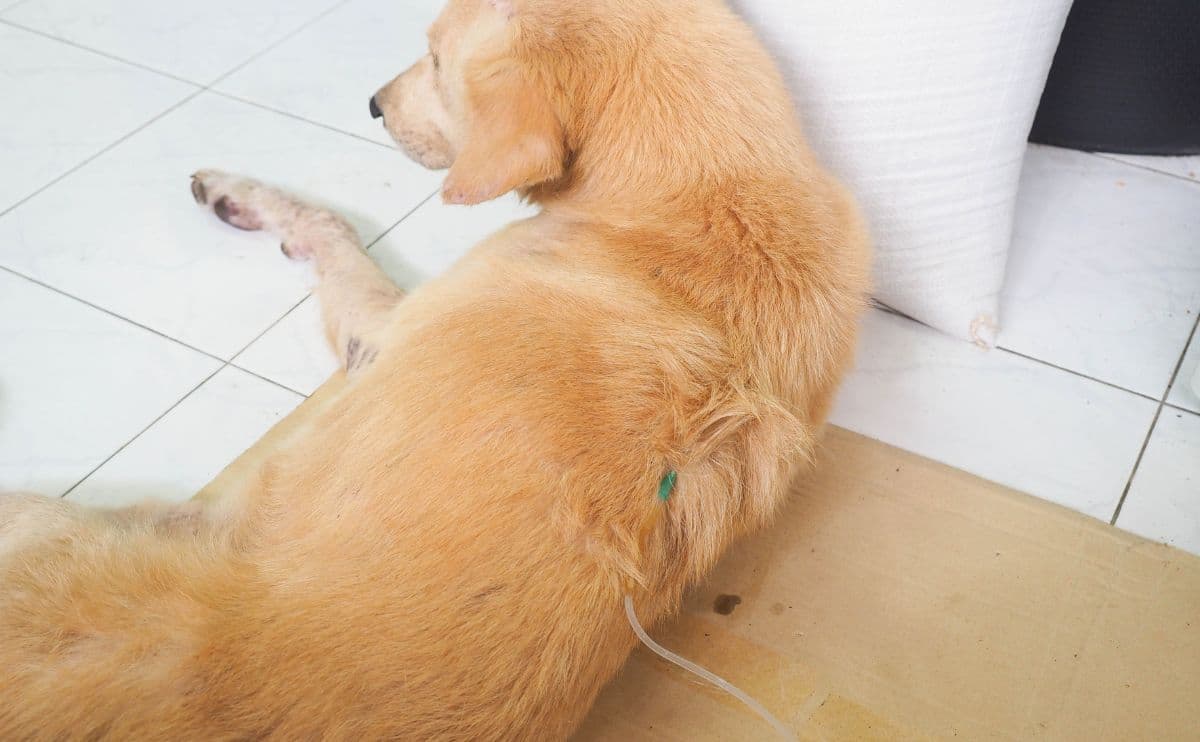
Kidney disease in dogs is a scary diagnosis for pet parents. After all, we want to spend as much time as possible with our furry family members, and the worries and concerns posed by the possibility of having to say an unexpected goodbye can take their toll. So, what is renal failure in dogs? Lets find out about the causes, the signs and symptoms, the treatment options, and how to know when its time for that final goodbye.
What Causes Kidney Failure In Dogs?
There are lots of causes of kidney failure in dogs. Toxicities from certain foods, anti-freeze, certain medications, and lilies can cause acute renal failure, even in young pets, while in some cases, the kidneys can lose their function slowly with age. Conditions like high blood pressure, cancer, bladder stones, and kidney infections can also contribute to kidney failure.
Which Foods Cause Kidney Failure In Dogs?
Grapes and raisins (and foods that contain them) can lead to kidney failure. This means that the festive period, where cookies, fruit cake, Christmas pudding, panettone, and other raisin-filled treats are everywhere, is a common time to see renal failure in dogs from toxicity.
Unfortunately, the underlying reason why grapes cause kidney damage is unknown, which means that theres no known toxic dose. Some dogs can eat grapes regularly and have no issues, while others can eat just one as a one-off with grave consequences. Therefore, its best to avoid giving your dog grapes altogether and keep them safely out of your dogs reach.
Signs Of Kidney Failure In Dogs
The signs of kidney failure in dogs are variable, depending on the stage of the disease and whether the kidney failure is acute or chronic.
Acute Kidney Failure
If your dog has acute renal failure from a toxin, obstruction, or severe infection, the symptoms are likely to come on very quickly and progress rapidly. You might notice symptoms within a couple of days of the toxicity or sooner in the case of anti-freeze. The first symptoms could be lethargy, pain, vomiting, or increased thirst. This could quickly progress to little or no urination, wobbliness, seizures, coma, or death.
Sadly, in many toxicity situations, once the kidney damage is severe enough to cause symptoms, there is far less chance of treatment being successful. Therefore, if you suspect your dog could have ingested any kind of toxin, call your veterinary clinic immediately so that appropriate measures can be taken to try to prevent any organ damage.
Chronic Kidney Failure
If your dog has chronic kidney disease, their symptoms are likely to be much more subtle and slower to develop. You might initially notice that your dog drinks more than normal or passes large volumes of urine more frequently. You might notice your pup has lost some weight, is vomiting, or hes not so interested in his food anymore. Canines with chronic kidney failure likely also seem to be subdued or lethargic.
As chronic kidney failure progresses, their thirst may become more and more excessive, but despite this, they might become dehydrated, leading to weakness and further lethargy. They may develop ulcers in their mouth, and you might notice an unpleasant smell from their mouth as the toxic waste products build up in their bloodstream. Eventually, theyll stop eating and drinking altogether, become very nauseous, and may seem painful in their abdomen.
What Causes The Symptoms Of Kidney Failure In Dogs?
The role of the kidneys within your dogs body is to control how much water leaves the body, regulate the loss of electrolytes, and remove waste products like urea from the bloodstream. In renal failure, the kidneys are no longer able to produce concentrated urine, so waste products build up in the blood. As more and more of the tiny kidney nephrons are affected, it puts more strain on the remaining parts that still work, which becomes a vicious circle.
The halitosis noted by pet owners who have dogs with chronic kidney failure is due to the build-up of these toxins and is known as a uremic smell. In some dogs, but primarily cats, small blood vessels are damaged by the urea compounds, leading to ulcers in areas like the edge of the tongue.
4 Stages Of Kidney Failure In Dogs
When it comes to the symptoms of kidney failure in dogs, stages matter. Kidney failure cases can be grouped into different stages, as formulated by the International Renal Interest Society (IRIS). The symptoms are combined with the urine concentration and blood measurements of urea, creatinine, and SDMA, which are waste products usually excreted by healthy kidneys.
In the early IRIS stages, symptoms are not apparent, whereas later, as the disease progresses, more and more symptoms appear. The IRIS stages of kidney failure in dogs illustrate the amount of kidney damage or the amount of kidney tissue that is still functional. They also aid veterinarians in determining the best treatment and management options.
Dog Kidney Failure Stages Chart
You can see the stages of chronic kidney disease in dogs in the following graphic:
| Stage | Creatinine | SDMA | Urine | Symptoms |
|---|---|---|---|---|
| I | Normal | Normal or slightly raised | May be inadequate concentration, may contain protein | None |
| II | Normal or mildly increased | Mildly raised | Inadequate concentration, may contain protein | None or very mild |
| III | Moderately increased | Moderately raised | Inadequate concentration, may contain protein | Often drinking and urinating more, may be more severe symptoms |
| IV | Markedly increased | Markedly raised | Inadequate concentration, protein likely | Weight loss, vomiting, reduced appetite, drinking and urinating more |
How To Treat Kidney Failure In Dogs
Unfortunately, when a kidney tubule (or nephron) stops working, it cant be fixed. However, treatment and good management can help to slow down the progression of kidney disease and support the remaining functional nephrons. Dogs who are still eating well and arent vomiting may only require a prescription kidney diet.
If their phosphate levels are high, a phosphate binder medication will also help by preventing the absorption of phosphate from their food. If your dog is still in the early stages of chronic kidney disease but isnt eating well or is nauseous, an anti-emetic medication may also be used.
Finally, if your dog has late stage III or stage IV kidney disease, theyll probably need to stay in the hospital for a fluid drip to flush the waste products out of the body and lower the urea and creatinine levels. Unfortunately, this improvement will only be temporary, and over time, the levels will increase once again.
When To Euthanize?
Whenever youre dealing with a chronic health issue in your dog, its really difficult to know when to make the sad decision to euthanize them. After all, theyre likely to have good and bad days, and it might feel like they get a little bit better just when you are about to make the call. The most important thing is to consider your dogs quality of life whether theyre eating, mobile, or showing any signs of pain.
If theyre struggling in more than one of those areas, despite veterinary treatment, its likely to be time to say goodbye. Its also worth looking back over the last two weeks to see how many good and bad days theyve had. If the bad days outweigh the good, euthanasia is the kindest option for your canine companion.

Frequently Asked Questions
Here are some common questions about dogs with kidney issues. Dont see yours here? Ask us in our comments.
Does pet insurance cover kidney disease in dogs?
Yes, pet insurance covers kidney disease in dogsas long as no signs or symptoms appear until after policy enrollment and waiting periods have passed.
What happens in the last days of a dog with kidney failure?
In the last days of a dog with kidney failure, theyre likely to stop eating or drinking altogether. They may be weak and wobbly from dehydration, and their other organs may start to fail. If you notice that your dog with kidney failure is deteriorating, you should contact your vet as soon as possible.
Is kidney failure in dogs painful?
Acute kidney failure, due to causes like toxins, infections, or bladder stones, can be very painful and requires emergency assessment by a veterinarian. Chronic renal failure is unlikely to be painful initially, but in the more severe stages of the disease, your dog may feel nauseous, disorientated, or painful.
What is the cost of treating kidney failure in dogs?
The cost of treating kidney failure will vary depending on your location and the type of treatment your dog needs. The most costly would be a fluid drip and hospitalization, but ongoing prescription diets and phosphate binders can also add up in the long term.
How long can a dog live with kidney failure?
The length of time that a dog can live with kidney failure will depend on the stage when the diagnosis was made. If caught early, chronic kidney failure can be managed for several years in some cases. However, if the disease is already advanced or management guidelines arent followed, a dogs quality of life may suffer within a few weeks or months.
What level of creatinine indicates kidney failure in dogs?
A dogs creatinine level should always be evaluated alongside a urine sample. If the urine sample shows poor concentration and the creatinine level is raised, this indicates that the kidneys are not functioning effectively.
Understanding Dogs Health
Kidney disease in dogs is a complex subject, and if the diagnosis is made early, even before your dog shows symptoms, the prognosis is much more favorable. Therefore, it may be a good idea to consider routine blood tests once your dog is older than seven or eight, and you should keep a close eye out for possible symptoms. You might consider an at-home urine test, that can help detect things like kidney stones and urinary tract infections in dogs.
Tagged With:
